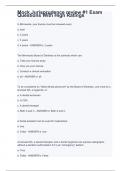MN Jurisprudence Green light Samenvattingen, Aantekeningen en Examens
Op zoek naar een samenvatting over MN Jurisprudence Green light? Op deze pagina vind je 6 samenvattingen over MN Jurisprudence Green light.
Alle 6 resultaten
Sorteer op
Colorado Exam Bundle With Complete Solutions
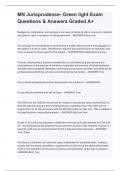
-
MN Jurisprudence- Green light Exam Questions & Answers Graded A+
- Tentamen (uitwerkingen) • 11 pagina's • 2024
-
- $10.99
- + meer info
Negligence, malpractice, and autonomy are basic principle of ethics. Autonomy refers to the patient's right or condition of self-government. - ANSWER-False; true The principle of nonmaleficence declares that a health care provider's first obligation to the patient is to do no harm. Beneficence requires that existing harm be removed, and focus is placed on doing good for the patient. - ANSWER-Both statements are true Conduct unbecoming a licensee includes (but is not limited to) gross ign...
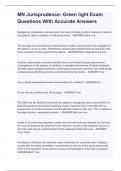
-
MN Jurisprudence- Green light Exam Questions With Accurate Answers
- Tentamen (uitwerkingen) • 11 pagina's • 2024
-
- $10.49
- + meer info
Negligence, malpractice, and autonomy are basic principle of ethics. Autonomy refers to the patient's right or condition of self-government. - ANSWER-False; true The principle of nonmaleficence declares that a health care provider's first obligation to the patient is to do no harm. Beneficence requires that existing harm be removed, and focus is placed on doing good for the patient. - ANSWER-Both statements are true Conduct unbecoming a licensee includes (but is not limited to) gross ign...
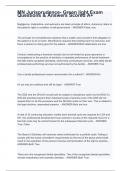
-
MN Jurisprudence- Green light Exam Questions & Answers Scored A+
- Tentamen (uitwerkingen) • 11 pagina's • 2024
- Ook in voordeelbundel
-
- $10.49
- + meer info
Negligence, malpractice, and autonomy are basic principle of ethics. Autonomy refers to the patient's right or condition of self-government. - ANSWER-False; true The principle of nonmaleficence declares that a health care provider's first obligation to the patient is to do no harm. Beneficence requires that existing harm be removed, and focus is placed on doing good for the patient. - ANSWER-Both statements are true Conduct unbecoming a licensee includes (but is not limited to) gross ign...
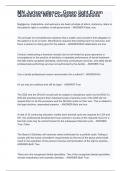
-
MN Jurisprudence- Green light Exam Questions With Complete Solutions
- Tentamen (uitwerkingen) • 11 pagina's • 2024
- Ook in voordeelbundel
-
- $10.99
- + meer info
Negligence, malpractice, and autonomy are basic principle of ethics. Autonomy refers to the patient's right or condition of self-government. - ANSWER-False; true The principle of nonmaleficence declares that a health care provider's first obligation to the patient is to do no harm. Beneficence requires that existing harm be removed, and focus is placed on doing good for the patient. - ANSWER-Both statements are true Conduct unbecoming a licensee includes (but is not limited to) gross ign...
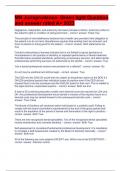
-
MN Jurisprudence- Green light Question and answer rated A+ 2023
- Tentamen (uitwerkingen) • 9 pagina's • 2023
-
Ook in voordeelbundel
-
- $12.49
- + meer info
MN Jurisprudence- Green light Question and answer rated A+ 2023Negligence, malpractice, and autonomy are basic principle of ethics. Autonomy refers to the patient's right or condition of self-government. False; true The principle of nonmaleficence declares that a health care provider's first obligation to the patient is to do no harm. Beneficence requires that existing harm be removed, and focus is placed on doing good for the patient. Both statements are true Conduct unbecomin...

